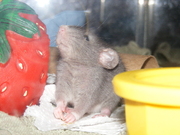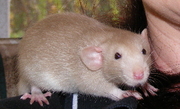Rat Haven Rescue - Sanctuary for Homeless Rats
Is a Rat the Right Pet for You?
This page will help you with general information regarding the care and needs of a pet rat. It will also give you some information about the animal to hopefully help you better determine if a rat is the right pet for you!
Diet, Feeding & Housing
Diet:
-High quality lab blocks should be the base of a rat's diet!
-A healthy diet includes 80% dry food and 20% fruits and vegetables such as broccoli, kale, cooked sweet potatoes, grapes and bananas.
-Treats should not exceed 10% of a rat's daily intake.
-Clean, fresh, filtered, chlorine-free water changed daily
-Never feed a rat chocolate, alcohol or caffeine as these can cause serious medical problems.
-A daily vitamin supplement is reccommended.
Feeding:
-Food and water should always be available.
-Offer small amounts of fruits and vegetables.
-Discard food if not eaten within 24 hours.
Housing:
-It is best to provide the largest habitat possible. Rats love to climb so a tall habitat is recommended as it will allow you to create challenges for your rat.
-Rats acclimate to normal household temperatures, be cautiousof extreme temperature changes.
-Habitats should never be in direct sunlight or in a drafty area.
-Habitats can be of glass, plastic or metal and should have an escape-proof solid bottom. Be careful of areas that can be chewed off by your ratties when looking for that perfect cage.
- 1 to 2 inches of paper (such as Carefresh) or Aspen bedding is reccomended. It is also helpful to litter box train your rats! I use the ferret corner litter boxes for my guys and just put a little recyled paper bedding in it.
Cleaning:
-Remove wet spots daily.
-Change bedding weekly or more often as needed.
-Clean the habitat and its contents once a week with mild soap and water, rinse and allow it to dry completely before placing rats back into habitat.
-Never house different types of small animals together and always introduce new rats to your current ones on neutral territory. A bathtub works well for introductions.
Rat Stats!
Average Size: 8 inches long between 1 and 2 pounds at maturity
Average Life Span: 2 1/2 years, although some can live as long as 4 to 5 years with proper care
-Rats are best Kept in Same-Sex Pairs. Never house male and female rats together unless you plan on having lots of babies!
-Rats are nocturnal and rest most of the day, although they have been known to adjust quite well to their owners schedule.
-Rats are intelligent, extremely social and enjoy human interaction. You must provide daily, supervised time for the rat outside of its habitat.
Rat Health Care
Signs of a Healthy Animal:
-Active, alert and sociable
-Healthy fur
-Clear eyes
-Eats and drinks regularly
-Communicates by squeaking
-Walks normally
Red Flags:
-Weight loss
-Distressed breathing
-Skin lesions
-Abnormal hair loss
-Lethargic
-Overgrown teeth
-Diarrhea or dirty bottom
-Eye or nasal discharge
***If you notice any of these signs, please contact your exotic animal veterinarian.***

